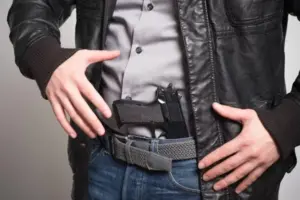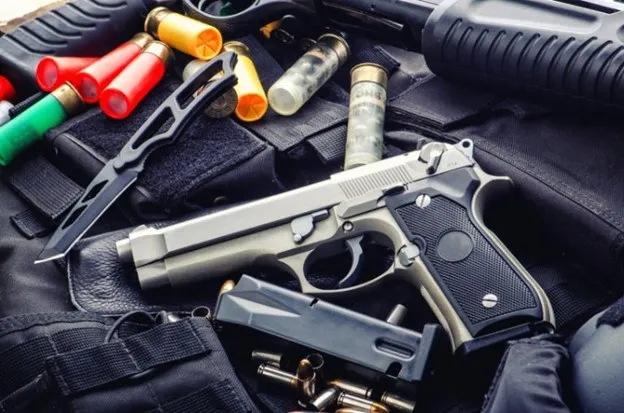Navigating Denver Weapon Crime Laws Effectively

Effectively understanding and adhering to Denver’s weapon crime laws is of utmost importance for both residents and visitors to the city. Grasping the nuances of these laws is essential to ensure compliance and avoid legal consequences. This guide aims to provide a comprehensive overview of Denver’s weapon crime laws, covering topics such as prohibited weapons, the process of obtaining concealed carry permits, staying up-to-date with regulatory changes, and understanding laws related to weapon storage and transportation.
Additionally, it offers guidance for individuals facing weapon crime charges in Denver. By following these guidelines and staying well-informed, individuals can navigate Denver’s weapon crime laws effectively and ensure their actions remain within legal boundaries.
Understanding Denver’s Weapon Crime Laws
In Denver, comprehending the weapon crime laws is essential for ensuring public safety and legal compliance. These laws, established within the city’s legal framework, regulate the possession, use, and sale of weapons, including firearms. Denver’s regulations are designed to prevent the misuse of weapons, ranging from illegal weapons to dangerous weapons, and to promote lawful protection and safety.
The city’s laws specify which types of weapons are prohibited and detail the requirements for legally owning and using firearms, with a focus on prosecuting weapon crimes. This includes obtaining valid permits and licenses for the purchase of firearms. To comply with these laws, individuals must go through processes like background checks and fulfill specific criteria set by both local and federal regulations. The city is dedicated to ensuring the enforcement of these regulations and prosecuting weapon crimes, underscoring its commitment to public safety and responsible firearm ownership.
Furthermore, Denver’s weapon crime laws are in alignment with federal restrictions, as outlined in the National Firearms Act and the Gun Control Act. These acts impose additional conditions on the ownership and use of firearms, such as restrictions on carrying firearms in government buildings or the necessity of purchasing firearms from a licensed firearms dealer.
An important aspect of these laws is the emphasis on proper identification marks on firearms, ensuring that each weapon can be traced back to its legal authority. It’s crucial for residents and visitors in Denver to be aware of these regulations, including weapon crime statistics, to prevent unintentional legal violations and to understand their rights and responsibilities when it comes to weapon ownership and use.
Prohibited Weapons and Their Legal Implications
Denver’s weapon crime laws are designed to define the legal consequences associated with having restricted weapons. These regulations have the purpose of safeguarding the safety and welfare of the community by limiting the ownership and usage of specific weapons known to be perilous or having the potential to cause harm.
Examples of prohibited weapons in Denver encompass, but are not restricted to, firearms with unlawful modifications, automatic firearms, explosive devices, and specific types of knives. Possessing such restricted weapons can lead to significant penalties, involving fines and imprisonment. It is crucial for individuals in Denver to be informed about these laws, grasp the legal ramifications of having prohibited weapons, and take steps to prevent potential legal issues while abiding by the law.
Obtaining a Concealed Carry Permit in Denver
In Denver, individuals seeking to legally carry a concealed weapon must go through the process of obtaining a concealed carry permit. This permit is essential for those who wish to carry a concealed firearm and involves meeting specific eligibility criteria and completing an application process.
In the realm of Denver weapon crime prevention, these stringent application processes and background checks play a pivotal role in maintaining public safety. The primary requirements for applicants include being at least 21 years of age and demonstrating competency in handling and using firearms. Competency typically involves completing a firearms training course that is recognized by the Colorado Bureau of Investigation.
Another crucial step in the application process is passing a background check. This check reviews the applicant’s criminal history, mental health records, and any instances of domestic violence, ensuring the person’s eligibility under gun rights and carry laws.
Furthermore, it is crucial for applicants to have a grasp of the regulations related to illegal weapon possession and the potential repercussions of repeated violations, which could result in the loss of certain rights. After fulfilling all these prerequisites, the application can be submitted to the local sheriff’s office for evaluation and processing.
It’s worth noting that while a concealed carry permit grants permission to carry a concealed firearm, it does not grant the holder the authority to carry weapons in specific locations where such actions are prohibited. Individuals possessing a concealed carry permit must be well-informed about these restrictions to steer clear of any legal issues.
Staying Informed About Changes in Weapon Regulations
To stay updated on alterations to weapon regulations, individuals in Denver should consistently refer to reputable sources for the latest updates and amendments. It is of utmost importance for gun owners and enthusiasts to remain well-informed about any changes or additions to the current laws to guarantee compliance and prevent potential legal consequences.
One reliable source of information is the Denver Police Department’s official website, where they provide updates on weapon regulations, including any changes or new laws that have been enacted. Additionally, individuals can also consult legal experts specializing in weapon laws to receive accurate and up-to-date information.
By staying informed about changes in weapon regulations, individuals in Denver can ensure that they are abiding by the law and making responsible choices when it comes to firearm ownership and usage.

Navigating Weapon Storage and Transportation Laws
When it comes to weapon storage and transportation in Denver, there are important legal requirements that individuals must adhere to. This includes properly storing firearms in a secure manner and ensuring that they are transported in accordance with the law. Failure to comply with these regulations can result in serious penalties, making it crucial for gun owners to understand and follow the proper procedures.
Legal Storage Requirements
By adhering to Denver’s legal storage requirements, individuals can navigate weapon storage and transportation laws effectively. To ensure compliance, here are four key points to consider:
- Secure Storage: Firearms must be stored in a locked container or equipped with a tamper-resistant lock. This prevents unauthorized access and reduces the risk of theft or misuse.
- Ammunition Separation: It is crucial to store firearms separately from ammunition. Keeping them apart enhances safety and reduces the likelihood of accidental discharge.
- Vehicle Transportation: When transporting firearms in a vehicle, they should be stored unloaded in a locked container or secured with a cable or trigger lock. This ensures safe transportation and prevents access by unauthorized individuals.
- Public Transportation Restrictions: It is important to note that Denver’s public transportation system prohibits the carriage of firearms, even if legally owned. Consider alternative means of transportation when traveling with weapons.
Proper Transportation Procedures
To guarantee adherence to Denver’s laws on weapon storage and transportation, individuals should have a clear grasp of the correct procedures for safely moving firearms. It is essential to follow these protocols to sidestep any potential legal issues and, more importantly, to prioritize the safety of oneself and others. Foremost, it’s necessary to transport firearms in an unloaded state, which entails removing any ammunition from the weapon and storing it separately.
Additionally, firearms should be securely stored in a locked container, such as a gun case or a locked trunk, to prevent unauthorized access. It is also important to properly secure the firearm within the vehicle to prevent any movement or shifting during transportation. By adhering to these proper transportation procedures, individuals can navigate Denver’s weapon storage and transportation laws effectively and responsibly.
Potential Penalties for Non-Compliance
Violations of Denver’s weapon storage and transportation laws can result in severe penalties. It is crucial for individuals to be aware of these penalties to ensure compliance with the law and avoid facing legal consequences. The potential penalties for non-compliance with Denver’s weapon storage and transportation laws include:
- Fines: Individuals found to be in violation of weapon storage and transportation laws may be subject to substantial fines. The amount of the fine can vary depending on the specific circumstances of the case.
- Probation: In some cases, individuals may be placed on probation as a penalty for non-compliance. This may involve regular check-ins with a probation officer and adherence to certain conditions set by the court.
- Loss of Firearm Rights: Non-compliance with weapon storage and transportation laws can lead to the loss of firearm rights, including the right to possess and carry firearms.
- Incarceration: In serious cases or for repeat offenders, incarceration may be imposed as a penalty. This can result in the individual being sentenced to jail or prison for a specified period of time.
It is essential to consult with an experienced attorney to navigate Denver’s weapon storage and transportation laws effectively and avoid these potential penalties.
What to Do if Facing Weapon Crime Charges in Denver
If facing weapon crime charges in Denver, it is crucial to seek legal representation immediately. Weapon crime charges can have serious consequences, including fines, probation, and even imprisonment. Hiring an experienced defense attorney who specializes in weapon crime cases can make a significant difference in the outcome of your case.
The first step in navigating weapon crime charges in Denver is to consult with a knowledgeable attorney. They will review the details of your case, evaluate the evidence against you, and develop a strong defense strategy. They can also guide you through the legal process, ensuring that your rights are protected and advocating for the best possible outcome.
Additionally, it is important to cooperate fully with your attorney and provide them with any relevant information or evidence that can support your defense. Remember to remain calm and avoid discussing your case with anyone other than your attorney.
Conclusion
Understanding and navigating Denver’s weapon crime laws is crucial for residents to ensure they comply with the regulations and avoid potential legal consequences. This includes being aware of prohibited weapons, obtaining the necessary permits, staying informed about any changes in regulations, and adhering to laws related to storage and transportation. If facing weapon crime charges in Denver, it is important to seek legal assistance to navigate the legal process effectively.
